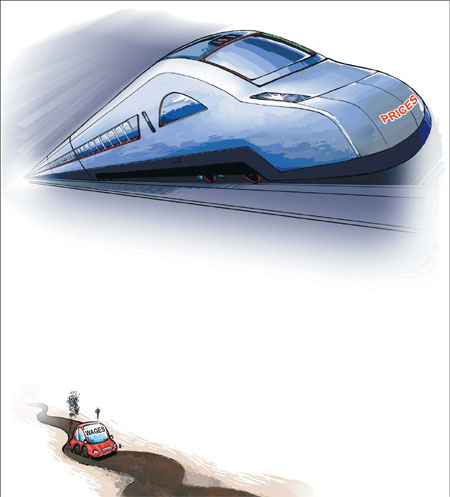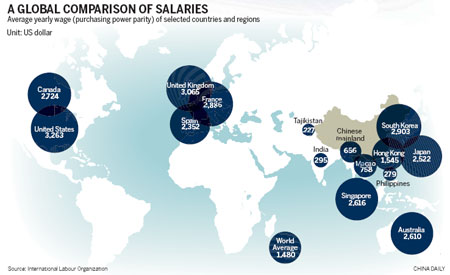Calculating the power of your hard-earned yuan
Updated: 2012-05-01 08:07
By Chen Xin (China Daily)
|
|||||||||
Insecure living
Wu Fei works at a perfume design company in Beijing and earns more than 5,000 yuan a month an above-average income by either calculation.
Wu said he spends 1,100 yuan a month on renting an apartment, which he shares with two other people, about 1,500 yuan on food, and another 500 yuan on telephone, transport, and water and electricity bills.
"I can live on that income, but the disposable part, what's left to spend, is less than 2,000 yuan. I don't feel very secure with that because I wouldn't know how to deal with a sudden sickness or other emergencies with such a small sum of money," he said.
Wu said he is considering finding part-time jobs to make more money. But how much would be enough to feel secure?
An online forum has attracted calculations and suggestions recently from around the country. The site posted a list of baseline wages that would satisfy people in 2012 in different cities. In Beijing, the bottom line would be 8,550 yuan a month while in Shanghai they're looking to earn at least 9,250 yuan.
According to the statistics authorities in these cities, the average monthly salary of workers in Beijing in 2011 was 4,672 yuan and in Shanghai, 4,331 yuan.
Closing the gap

Liu Junsheng suggests several ways in which the gap between the low and high income groups can be reduced and the income of low earners raised to a more secure level.
"Workers in monopoly industries should have their wages raised at a much slower rate," he said. "And the monopoly in some of those industries should be broken to get rid of the conditions and environment that encourage big wage increases for high-ranking employees."
Liu added that the government's fiscal policies should favor SMEs more to help them increase profits, so they can afford to raise their workers' salaries.
The transfer of labor-intensive industries from coastal regions to western areas and the further development of industries in advanced areas should be carried out promptly, as this would help increase workers' pay, he said.
Experts also highlight the importance of collective negotiations between employers and workers to achieve steadier and fairer wage increases.
A recent industrial collective contract will give more than 100,000 software workers in Dalian, Liaoning province, a pay rise of at least 6 percent this year. Another contract will mean an 18 percent increase this year for 11,600 working for sports appliance manufacturers in Yangzhou, Jiangsu province.
For its part, the central government has pledged in its 12th Five-Year Plan (2011-15) that incomes will "keep pace with economic growth" and wages will "increase in line with improvements of productivity".
Delivering the government work report in March, Premier Wen Jiabao said the government is to set up a mechanism for scheduling income increases and to raise the minimum wage by at least 13 percent a year, in order to curb the widening income gap.
Wen also promised more effective adjustments to taxation to balance the incomes of different social strata. He said the government will strictly regulate the income of senior managerial staff at State-owned enterprises and financial institutions, and raise the income of low earners.

If successful, the plan will create a much larger middle-income group and narrow the gap in wealth generally. It will also be interesting to see if the ILO rates the purchasing power of their hard-earned yuan stronger or weaker than it is today.
Contact the writer at chenxin@chinadaily.com.cn

 Relief reaches isolated village
Relief reaches isolated village
 Rainfall poses new threats to quake-hit region
Rainfall poses new threats to quake-hit region
 Funerals begin for Boston bombing victims
Funerals begin for Boston bombing victims
 Quake takeaway from China's Air Force
Quake takeaway from China's Air Force
 Obama celebrates young inventors at science fair
Obama celebrates young inventors at science fair
 Earth Day marked around the world
Earth Day marked around the world
 Volunteer team helping students find sense of normalcy
Volunteer team helping students find sense of normalcy
 Ethnic groups quick to join rescue efforts
Ethnic groups quick to join rescue efforts
Most Viewed
Editor's Picks

|

|

|

|

|

|
Today's Top News
Health new priority for quake zone
Xi meets US top military officer
Japan's boats driven out of Diaoyu
China mulls online shopping legislation
Bird flu death toll rises to 22
Putin appoints new ambassador to China
Japanese ships blocked from Diaoyu Islands
Inspired by Guan, more Chinese pick up golf
US Weekly

|

|







